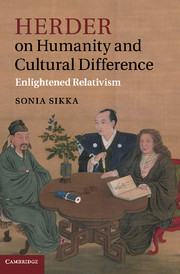Book contents
- Frontmatter
- Contents
- Acknowledgements
- Note on citation style
- Abbreviations and works cited by title
- Introduction
- 1 The question of moral relativism
- 2 Happiness and the moral life
- 3 History and human destiny
- 4 The concept of race
- 5 Language and world
- 6 The place of reason
- 7 Religious diversity
- Conclusion
- Bibliography
- Index
2 - Happiness and the moral life
Published online by Cambridge University Press: 03 May 2011
- Frontmatter
- Contents
- Acknowledgements
- Note on citation style
- Abbreviations and works cited by title
- Introduction
- 1 The question of moral relativism
- 2 Happiness and the moral life
- 3 History and human destiny
- 4 The concept of race
- 5 Language and world
- 6 The place of reason
- 7 Religious diversity
- Conclusion
- Bibliography
- Index
Summary
At one time, during the 1760s, Herder had been a student of Kant's, and had greatly admired the views communicated in his lectures of that period. Kant's highly unsympathetic review of the second part of Herder's Ideas for a Philosophy of the History of Mankind, published in 1785, however, shows how profound the philosophical differences between these two had become by this point. The nature of happiness, and its place within the “destiny” or “vocation” (Bestimmung) of the human race, forms a central area of dispute emerging from the review. Kant is responding, in particular, to a section of the Ideas entitled: “The happiness (Glückseligkeit) of human beings is everywhere an individual good; consequently, it is everywhere climatic and organic, a child of practice, tradition, and custom” (Ideas, 327). Although he is not mentioned by name, this section clearly contains critical rejoinders, often quite harsh in tone, to aspects of Kant's practical philosophy and philosophy of history, as Herder understands them. Against the idea that happiness requires extrinsic justification, for example, Herder insists that “every living creature takes delight in its life; it does not brood and ask, why is it there? Its existence is to it an end and its end is existence” (Ideas, 330).
- Type
- Chapter
- Information
- Herder on Humanity and Cultural DifferenceEnlightened Relativism, pp. 44 - 83Publisher: Cambridge University PressPrint publication year: 2011



